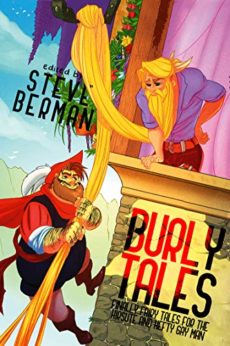 Burly Tales: Fairy Tales for the Hirsute and Hefty Gay Man
Burly Tales: Fairy Tales for the Hirsute and Hefty Gay Man LGBT Fairy Tale Fantasy/Romance/ANTHOLOGY
Lethe Press
July 29, 2021
195

What has been missing from the daring tales of fairy tale heroes is quite simply some heft. In Burly Tales, Lambda Literary Award-winning editor Steve Berman has gathered a dozen stories of whimsy and romance that feature gay men with plenty of curves and fur. Run away with us to enchanted woods, where the cubs and bears are not going to eat you (not without informed, enthusiastic consent), where no one will judge if you take up residence in a house with seven bearded men and only one bed, and where if you fall in love with a large, hairy man with a forbidding castle and a well-stocked library, he'll still be that way after you kiss him. Featuring an introduction by Matthew Bright and an afterword by award-winning ursine author Jeff Mann.

Reviewed by Ulysses Dietz
Member of The Paranormal Romance Guild Review Team
I’ve read themed anthologies before, but never quite like this one, combining updated fairy tales with body-positive stories related to, well, hefty hairy men. It’s not that I’ve never encountered a bear before in my wide-ranging reading of m/m romance, but the dozen stories in this appealing book form a collective act of defiance against the hegemony of slim, blond, white romantic heroes in gay fiction. Well done to all the authors, whose names I am not mentioning.
The dozen stories range widely in tone and scale, from the rather long “The Man Who Drew Cats,” which is clearly drawn from Japanese folktales, to the abruptly short “Heft,” which takes the old “Emperor’s New Clothes” chestnut and turns it into a brief, poignant take on body-shaming and self-image. The Japanese-inspired story was fascinating and also rather poignant, as was the bittersweet “El Muerto’s Godson,” itself clearly based on Mexican folklore. In both of those, which deal with magical beings and death, there is a lot of inspection of ethical boundaries and the idea of free-will vs fate.
Other stories in the mix are modernized gay spins on traditional stories we all might know from childhood. “The Bears Moved In” and “Three, to the Swizz’!” have moved rather dramatically away from their sources (Goldilocks and the Three Bears, and Three Billy Goats Gruff, respectively), but use the original story’s metaphor to offer up positive self-images for men who don’t fit the pretty-gay-boy stereotype. “The Three Little Prigs” falls into this mold, but is funny and sort of smart-ass in a way that had me chuckling with its “Sex In The City” hipster irony.
“The Red Bear of Norroway” is sort of a mash-up of “Beauty and the Beast” with an Nordic saga, while “Something Old, Something New, Something Borrowed, Something Blue” riffs on the Bluebeard myth, giving is a marvelously creepy sort of feminist spin that I found delightful.
“Snow Melt and Rose Bloom” seems to share a source with “The Most Luxuriant Beard of All” (the Snow White story, or maybe Snow White & Rose Red, which is not the same story at all). Both are told in the manner of timeless fairytales, but with pointedly contemporary notions of male/male relationships, and some startling ideas of forgiveness and redemption.
“Lesson Learned” is a sort of wry takeoff on “Rapunzel,” in which the lesson is not at all what I expected; while “A Giant Problem” is a goofy spin on “Jack and the Beanstalk” from the lonely giant’s point of view.
As an aging gay man who used to be a slim twink but has somehow, magically, evolved into a large-bellied hirsute man, these stories resonated with me more than they might have a decade ago. Then again, a decade ago writers weren’t producing anthologies like this. So, thank you.
